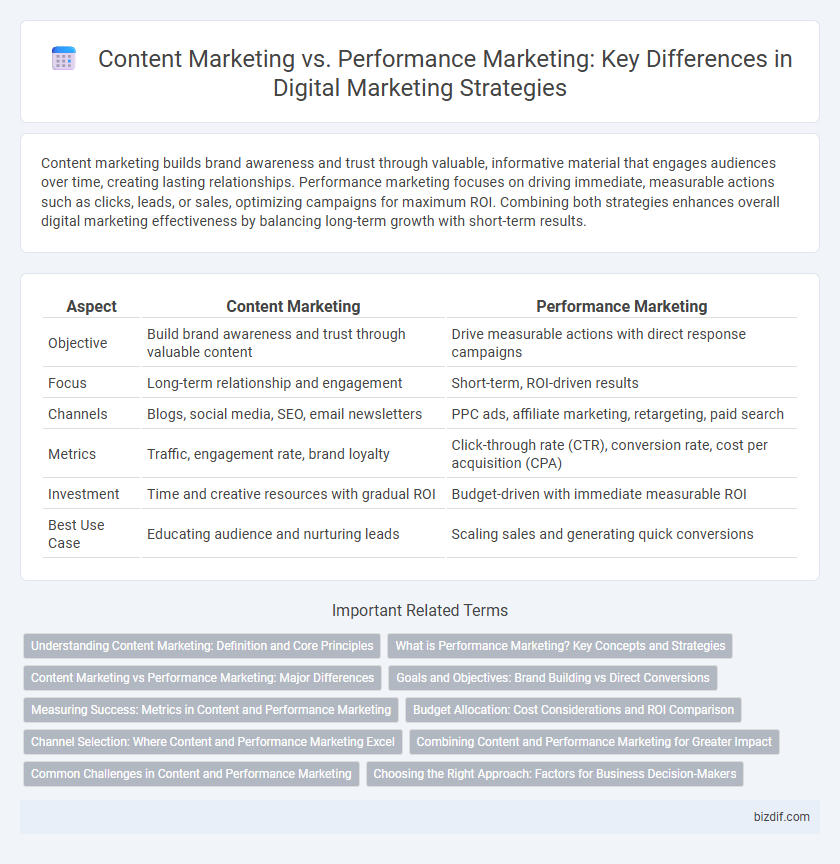Content marketing builds brand awareness and trust through valuable, informative material that engages audiences over time, creating lasting relationships. Performance marketing focuses on driving immediate, measurable actions such as clicks, leads, or sales, optimizing campaigns for maximum ROI. Combining both strategies enhances overall digital marketing effectiveness by balancing long-term growth with short-term results.
Table of Comparison
| Aspect | Content Marketing | Performance Marketing |
|---|---|---|
| Objective | Build brand awareness and trust through valuable content | Drive measurable actions with direct response campaigns |
| Focus | Long-term relationship and engagement | Short-term, ROI-driven results |
| Channels | Blogs, social media, SEO, email newsletters | PPC ads, affiliate marketing, retargeting, paid search |
| Metrics | Traffic, engagement rate, brand loyalty | Click-through rate (CTR), conversion rate, cost per acquisition (CPA) |
| Investment | Time and creative resources with gradual ROI | Budget-driven with immediate measurable ROI |
| Best Use Case | Educating audience and nurturing leads | Scaling sales and generating quick conversions |
Understanding Content Marketing: Definition and Core Principles
Content marketing is a strategic approach focused on creating and distributing valuable, relevant, and consistent content to attract and retain a clearly defined audience. It emphasizes storytelling, brand authority, and long-term engagement through formats like blogs, videos, and social media posts. Core principles include audience-centric messaging, authenticity, and delivering meaningful information that nurtures trust and drives organic growth.
What is Performance Marketing? Key Concepts and Strategies
Performance marketing is a data-driven digital marketing approach focused on measurable results such as clicks, leads, and sales, utilizing channels like PPC, affiliate marketing, and social media ads. Key concepts include cost-per-action (CPA), return on ad spend (ROAS), and conversion tracking to optimize campaigns in real-time. Strategies involve targeted audience segmentation, continuous A/B testing, and leveraging analytics platforms like Google Analytics and Facebook Ads Manager to maximize ROI.
Content Marketing vs Performance Marketing: Major Differences
Content marketing focuses on creating and distributing valuable, relevant content to attract and retain a clearly defined audience, enhancing brand awareness and loyalty over time. Performance marketing relies on measurable, data-driven campaigns designed to generate immediate results such as clicks, leads, and conversions, with a strong emphasis on ROI tracking. The major differences lie in content marketing's long-term brand building and engagement strategy versus performance marketing's short-term, direct-response goals and cost-per-action metrics.
Goals and Objectives: Brand Building vs Direct Conversions
Content marketing primarily aims at brand building by creating valuable, relevant content that fosters long-term audience engagement and trust. In contrast, performance marketing targets direct conversions through data-driven campaigns optimized for measurable actions like clicks, leads, or sales. Both strategies complement each other by balancing brand awareness with immediate ROI-focused results.
Measuring Success: Metrics in Content and Performance Marketing
Content marketing success is measured through metrics like organic traffic, engagement rate, time on page, and social shares, indicating brand awareness and audience loyalty. Performance marketing relies on precise, data-driven KPIs such as cost per acquisition (CPA), return on ad spend (ROAS), click-through rate (CTR), and conversion rate to track direct campaign effectiveness. Combining these metrics provides a comprehensive view of both long-term brand growth and immediate return on investment.
Budget Allocation: Cost Considerations and ROI Comparison
Content marketing typically requires a sustained budget allocation focused on creating valuable, engaging materials that build brand awareness and long-term customer relationships. Performance marketing involves targeted spending on paid ads with measurable metrics, allowing for precise cost control and immediate ROI tracking. Comparing ROI, performance marketing often delivers faster returns, while content marketing generates compounding value that enhances organic reach and customer loyalty over time.
Channel Selection: Where Content and Performance Marketing Excel
Content marketing excels on channels like blogs, social media, and email newsletters, where storytelling and audience engagement drive long-term brand loyalty. Performance marketing thrives on platforms offering direct response tracking, such as Google Ads, Facebook Ads, and affiliate networks, enabling precise ROI measurement and campaign optimization. Selecting the right channel depends on goals: brand awareness favors content marketing while conversion-driven campaigns benefit from performance marketing's data-driven platforms.
Combining Content and Performance Marketing for Greater Impact
Combining content marketing and performance marketing leverages the strengths of both strategies to drive sustainable growth and immediate results. Content marketing builds brand authority and engages audiences through valuable, relevant material, while performance marketing focuses on measurable outcomes like conversions and ROI through targeted campaigns. Integrating these approaches enhances customer journeys, boosts conversion rates, and maximizes the overall impact of digital marketing efforts.
Common Challenges in Content and Performance Marketing
Content marketing often faces challenges such as creating consistent, high-quality content that truly engages the target audience while maintaining SEO effectiveness. Performance marketing struggles with precise tracking, attribution of ROI, and optimizing campaigns for maximum conversion rates across multiple channels. Both strategies require continuous data analysis, audience understanding, and adapting to evolving digital trends to overcome issues related to budget constraints and changing consumer behavior.
Choosing the Right Approach: Factors for Business Decision-Makers
Selecting between Content Marketing and Performance Marketing hinges on business objectives, target audience, and budget allocation. Content Marketing excels in building brand awareness and long-term customer engagement through valuable, relevant content, while Performance Marketing drives measurable actions like clicks and conversions with precise ROI tracking. Companies prioritizing sustainable growth and brand loyalty should invest in Content Marketing, whereas those seeking immediate sales results benefit from Performance Marketing strategies.
Content Marketing vs Performance Marketing Infographic

 bizdif.com
bizdif.com